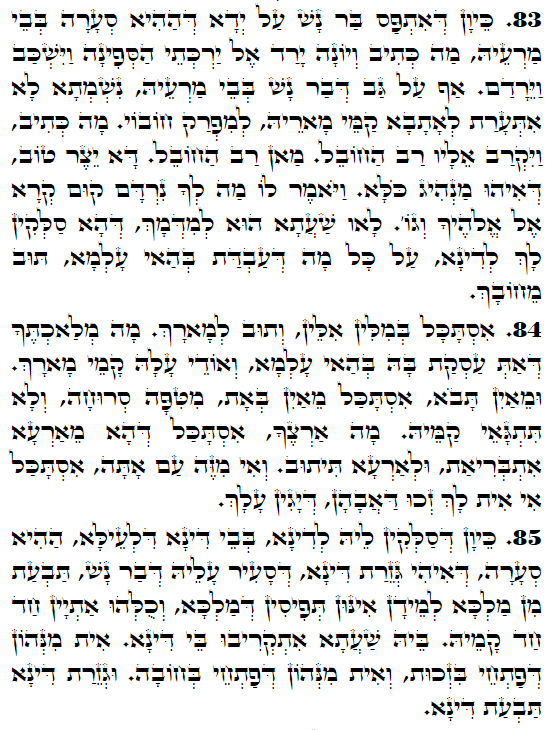Daily Zohar # 3294 – Vayakhel – Are you ready to save the ship?
.
Hebrew translation:
84. הִתְבּוֹנֵן בַּדְּבָרִים הַלָּלוּ וְשׁוּב לַאֲדוֹנְךָ. מַה מְּלַאכְתְּךָ – שֶׁאַתָּה עָסַקְתָּ בָּהּ בָּעוֹלָם הַזֶּה, וְהוֹדֶה עָלֶיהָ לִפְנֵי רִבּוֹנְךָ. וּמֵאַיִן תָּבוֹא – הִסְתַּכֵּל מֵאַיִן בָּאתָ, מִטִּפָּה סְרוּחָה, וְאַל תִּתְגָּאֶה לְפָנָיו. מָה אַרְצֶךָ – הִסְתַּכֵּל שֶׁהֲרֵי מֵהָאָרֶץ נִבְרֵאתָ וְלָאָרֶץ תָּשׁוּב. וְאֵי מִזֶּה עַם אָתָּה – הִסְתַּכֵּל אִם יֵשׁ לְךָ זְכוּת אָבוֹת שֶׁתָּגֵן עָלֶיךָ.
85. כֵּיוָן שֶׁמַּעֲלִים אוֹתוֹ לְדִין בְּבֵית דִּין שֶׁל מַעְלָה, אוֹתָהּ סְעָרָה, שֶׁהִיא גְּזֵרַת הַדִּין שֶׁסּוֹעֶרֶת עַל הָאָדָם, מְבַקֶּשֶׁת מֵהַמֶּלֶךְ לָדוּן אוֹתָם הַתְּפוּסִים שֶׁל הַמֶּלֶךְ, וְכֻלָּם בָּאִים אֶחָד אֶחָד לְפָנָיו. בְּאוֹתָהּ שָׁעָה מִתְקָרְבִים בֵּית הַדִּין. יֵשׁ מֵהֶם שֶׁפּוֹתְחִים בִּזְכוּת, וְיֵשׁ מֵהֶם שֶׁפּוֹתְחִים בְּחוֹבָה, וּגְזֵרַת הַדִּין תּוֹבַעַת דִּין.
.
Zohar Vayakhel
Continued from the previous study (DZ 2980). Please read it before continuing with this study.
#83
Jonah 1:5,6
“וַיִּירְאוּ הַמַּלָּחִים וַיִּזְעֲקוּ אִישׁ אֶל אֱלֹהָיו וַיָּטִלוּ אֶת הַכֵּלִים אֲשֶׁר בָּאֳנִיָּה אֶל הַיָּם לְהָקֵל מֵעֲלֵיהֶם וְיוֹנָה יָרַד אֶל יַרְכְּתֵי הַסְּפִינָה וַיִּשְׁכַּב וַיֵּרָדַם.”
“וַיִּקְרַב אֵלָיו רַב הַחֹבֵל וַיֹּאמֶר לוֹ מַה לְּךָ נִרְדָּם קוּם קְרָא אֶל אֱלֹהֶיךָ אוּלַי יִתְעַשֵּׁת הָאֱלֹהִים לָנוּ וְלֹא נֹאבֵד.”
“Then the mariners were afraid; and every man cried out to his god, and threw the cargo that was in the ship into the sea, to lighten the load. But Jonah had gone down into the lowest parts of the ship, had lain down, and was fast asleep.”
“So the captain came to him, and said to him, “What do you mean, sleeper? Arise, call on your God; perhaps your God will consider us, so that we may not perish.”
While the sailors were trying to mitigate the impact of the storm by throwing their cargo and praying to their gods, Jonah ignored the situation and went to the belly of the ship to sleep.
The captain that navigates the vessel, is the aspect of the good inclination. He awakened Jonah, encouraging him to pray to his God because judgments is rising and he needs to repent on his negative actions.
#84
The good inclination asks us to look back into the actions that lead us to the current situation that brought the storm on us.
In the process of repentance, we should see ourselves as simple vessels, humble with a temporary existence.
#85
The storm is the process a man goes through when he is taken to the upper court for final judgment. Those who experience the storm come before the judge one at a time and plead their cases. Some open their defense by telling their merits. Some open their defense with admitting their wrongdoing.
The prosecution asks for a judgment.
Lesson;
We are experiencing a great storm in the world. This is not a little storm somewhere far away from us. This storm affects the entire world.
It is a time of judgment and each one of us would be called to the upper court to present their case. We can not hide and sleep until the storm is over.
The Torah and our studies is the aspect of the captain that wakes us up to do personal ‘accounting’ and repent. The ‘cargo’ is the aspect of our attachment to the material world that is no longer important when we experience such a storm that can hurt anyone.
The Zohar talks about a time when some people would experience protection and some would live in fear, try to hide away from the judgment but even in New Zealand that is in the ‘belly’ of the ‘ship’, the storm can reach.
Jonah knew that he is responsible for the storm. He admitted and asked the sailors to throw him overboard and save themselves. Even though he was ready to give his life for his repentance, God saved him.
The Israelites have the responsibility to repent and save the world from the storm. Before our turn to appear in the upper court, we should do our best to follow the righteous path.
“שִׁמְעוֹן הַצַּדִּיק הָיָה מִשְּׁיָרֵי כְנֶסֶת הַגְּדוֹלָה. הוּא הָיָה אוֹמֵר, עַל שְׁלשָׁה דְבָרִים הָעוֹלָם עוֹמֵד, עַל הַתּוֹרָה וְעַל הָעֲבוֹדָה וְעַל גְּמִילוּת חֲסָדִים:”
“Shimon the Righteous was one of the last of the men of the great assembly. He used to say: the world stands upon three things: the Torah (Study), the service (Prayers), and the practice of acts of piety (Tzedakah and good deeds).”
{||}

 Previous: Vayakhel
Previous: Vayakhel


